Special Report
The 9 US Presidents Who Lived in Poverty
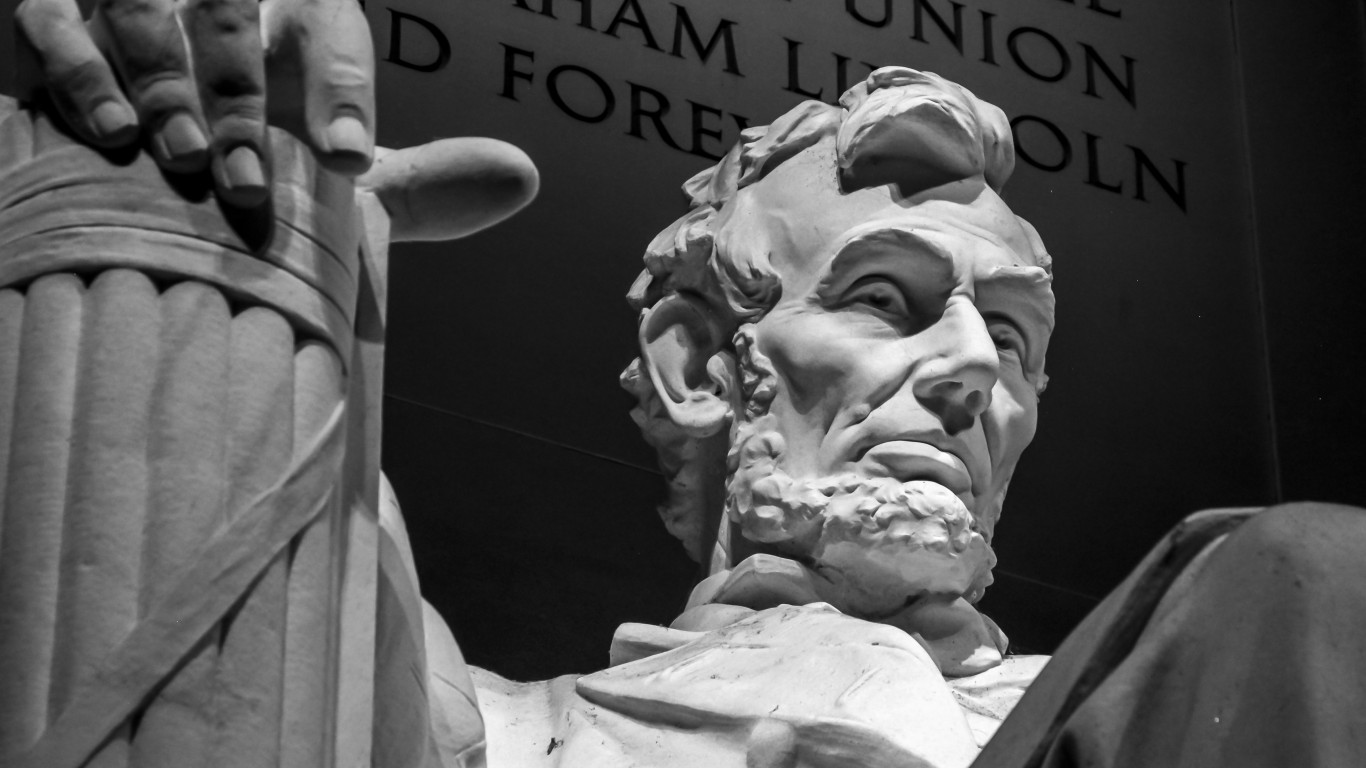
Published:
Last Updated:

The majority of presidents in U.S. history have been fairly wealthy. Adjusting each president’s net worth for today’s dollars, most would be considered multi-millionaires. Each of the last five presidents have a net worth of at least $20 million, adjusting for inflation.
Recent presidents have received multi-million dollar offers for the rights to their memoirs about life in the Oval Office. Despite the advantage that those with money and power have in presidential campaigns, and despite the lucrative opportunities afforded to those with the title of “ex-president,” there are nevertheless nine presidents who never achieved a net worth of over $1 million in their lifetimes.
24/7 Wall St. reviewed historical sources in order to determine which U.S. presidents never amassed a high level of wealth.
Many presidents who never became highly wealthy came from humble beginnings. Andrew Johnson, Abraham Lincoln, and James Garfield were born in log cabins. Most of the wealthiest presidents inherited family money and were able to live comfortably before going into public service. Many of the presidents born to less well-off families, however, were never able to accrue much money since public service jobs often do not pay much.
Presidents who never became wealthy had many different reasons for not achieving greater wealth. During the 1800s, access to education and upward economic and social mobility was extremely difficult for those living in rural areas, and yet they managed to successfully run for president.
Others struggled with their business ventures. Harry S. Truman was deeply in debt after his hat shop failed to take off before becoming president. Ulysses S. Grant invested tens of thousands of dollars in a business venture that ended up being a scam.
Click here to see the America’s 9 poorest presidents
24/7 Wall St. analyzed the finances of the presidents based on historical sources. We have accounted for hard assets such as real estate, estimated lifetime savings based on work history and inheritance. We also considered annual salaries, incomes earned from royalties on books, ownership of companies, yields from family estates, and other forms of income. The ranking is based on peak net worth, or how much a president’s combined assets were worth at the time in his life when he was the richest. All nine of the poorest U.S. presidents were worth less than $1 million when adjusted for inflation.
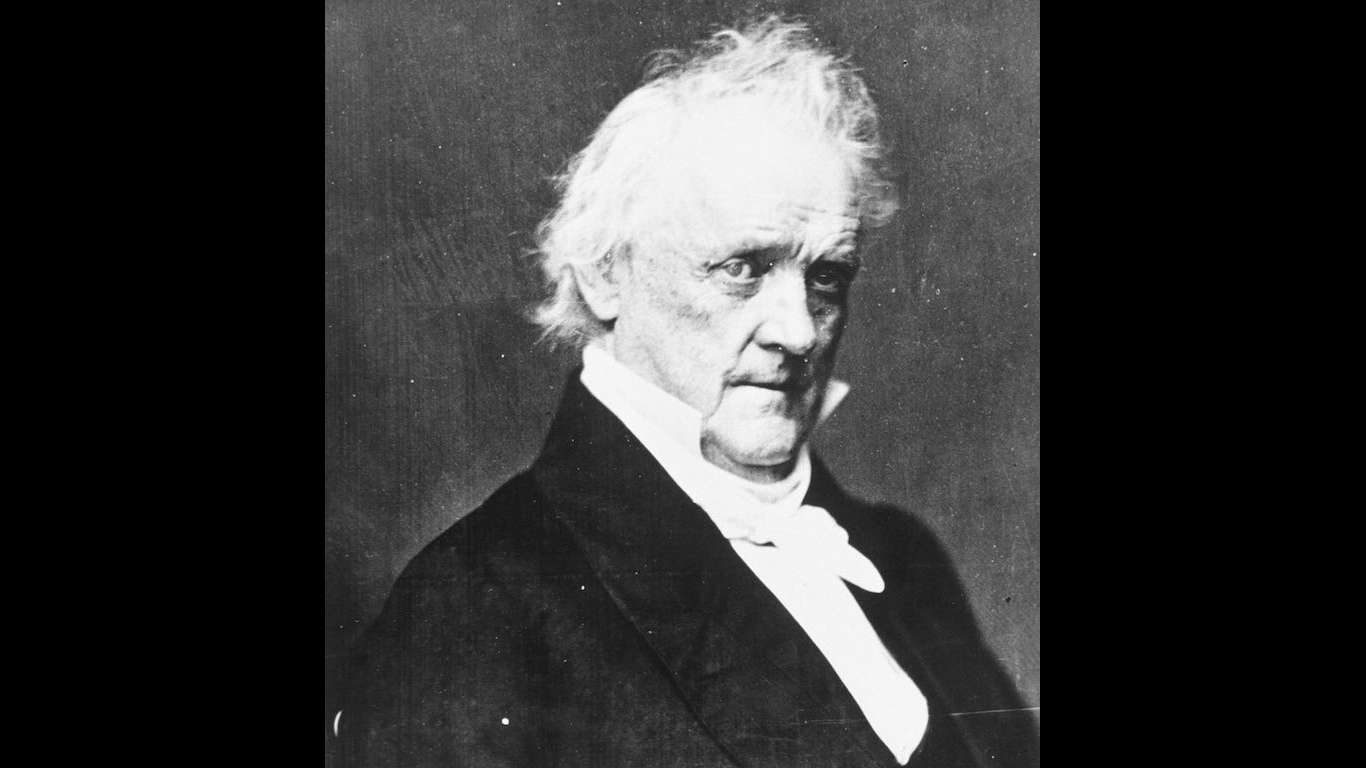
9. James Buchanan
> Term: 1857-1861 (15th president)
> Other occupations: Congressman, senator, secretary of state
> Birthplace: Franklin County, Pennsylvania
James Buchanan came from a well-off family, but he never made much money of his own since his entire career was in public service. After getting a law degree, Buchanan joined the military and served during the War of 1812 before being elected to the Pennsylvania House of Representatives. His political career included positions such as congressman, senator, and secretary of state. Buchanan never had to provide for anyone else as he was the only president who never married.
[in-text-ad]

8. Abraham Lincoln
> Term: 1861-1865 (16th president)
> Other occupations: Lawyer, general store owner, rail-splitter
> Birthplace: Hardin County, Kentucky
Born into a modest family, Abraham Lincoln’s rise to become one of the most well regarded presidents in history is nothing short of remarkable. Tall and strong, Lincoln made money in his early 20s doing manual labor like splitting wood. After moving to New Salem, Illinois, Lincoln tried out a number of other occupations, serving as town postmaster and owning a general store.Eventually, he found politics and won a seat in the Illinois state legislature. It was only after his election that he decided to become a lawyer, an occupation which set him on his political path.

7. Andrew Johnson
> Term: 1865-1869 (17th president)
> Other occupations: Tailor, alderman, mayor
> Birthplace: Raleigh, North Carolina
Andrew Johnson began his working life as a tailor, but his true passion always seemed to be in debating. Johnson frequently advocated for the common man and railed against plantations. He gained the support of his Greeneville, Tennessee community, eventually becoming alderman and mayor of the town. His political career continued its upward trajectory until he was put on Abraham Lincoln’s ticket for reelection in 1864. He took office after Lincoln’s assassination.
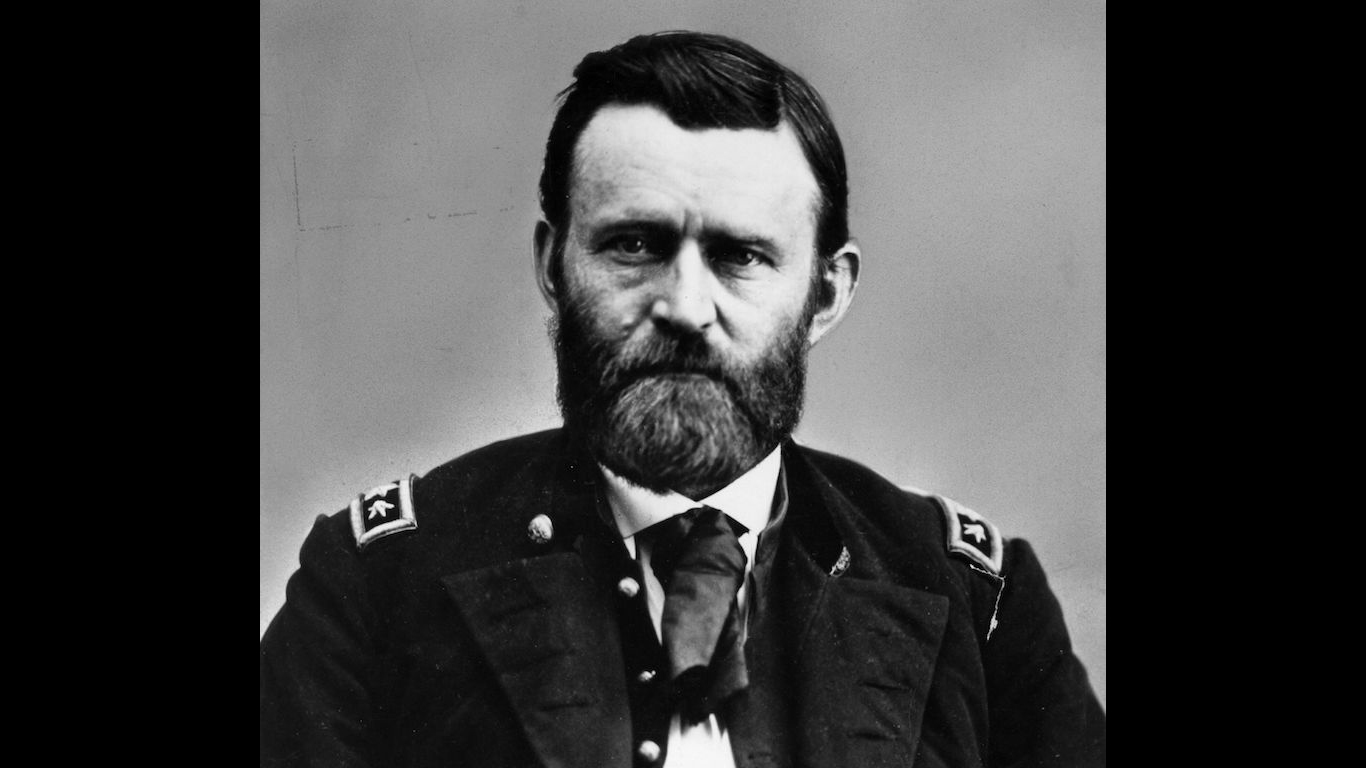
6. Ulysses Simpson Grant
> Term: 1869-1877 (18th president)
> Other occupations: General, leather shop worker, farmer
> Birthplace: Point Pleasant, Ohio
Ulysses S. Grant is renowned for his leadership of Union forces during the Civil War, but between that and his earlier service in the Mexican-American War, Grant struggled to find a career. After resigning from the Army in 1854, Grant failed in his attempts to work in farming and real estate, so he went to work for his father, who worked in leather goods. He returned to his true calling when the Civil War broke out.
[in-text-ad-2]
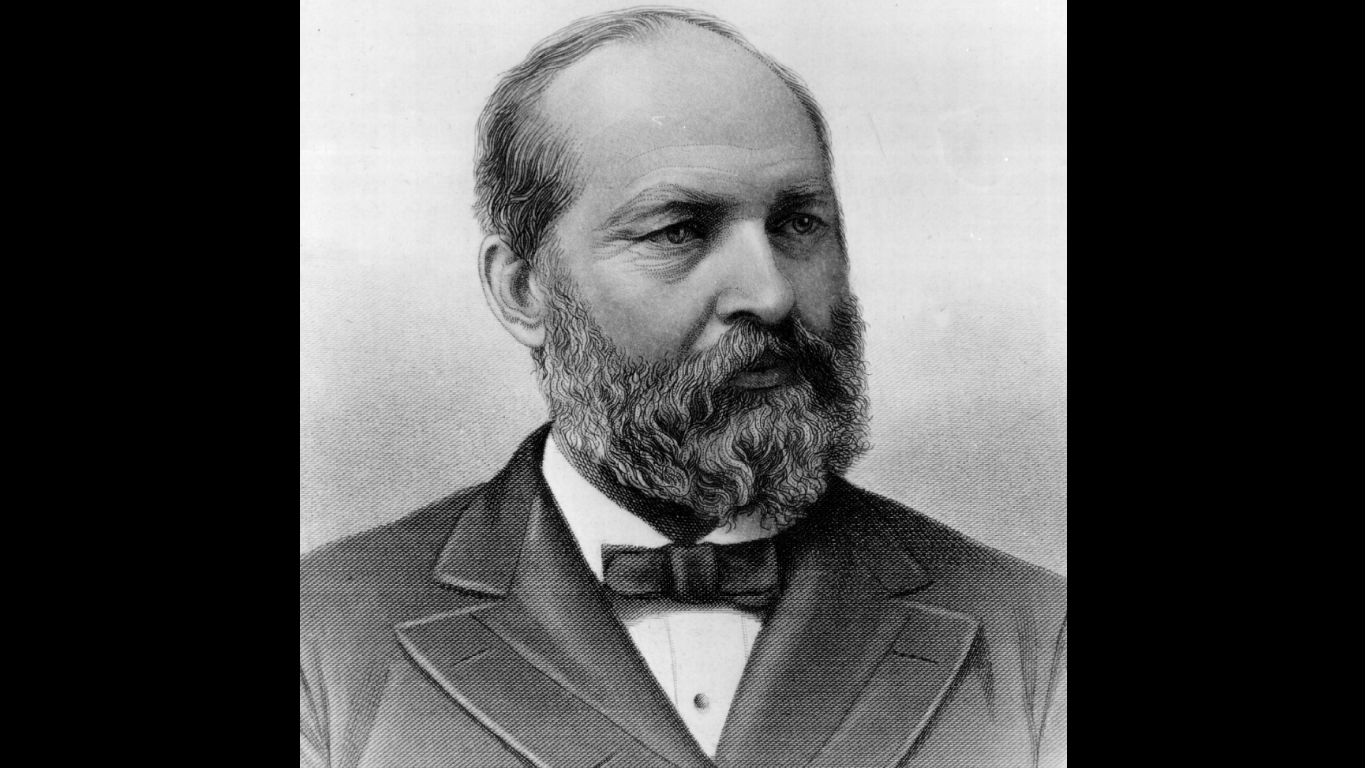
5. James Abram Garfield
> Term: 1881 (20th president)
> Other occupations: Teacher, general, congressman
> Birthplace: Orange, Ohio
James A. Garfield never pursued a lucrative career track, instead focusing on service. After completing his education at the Eclectic Institute, he returned to his alma mater and became a teacher of Greek and Latin. Before entering politics, Garfield was also ordained as a minister. He fought for the Union during the Civil war, leading Ohio’s 42nd volunteer infantry regiment.
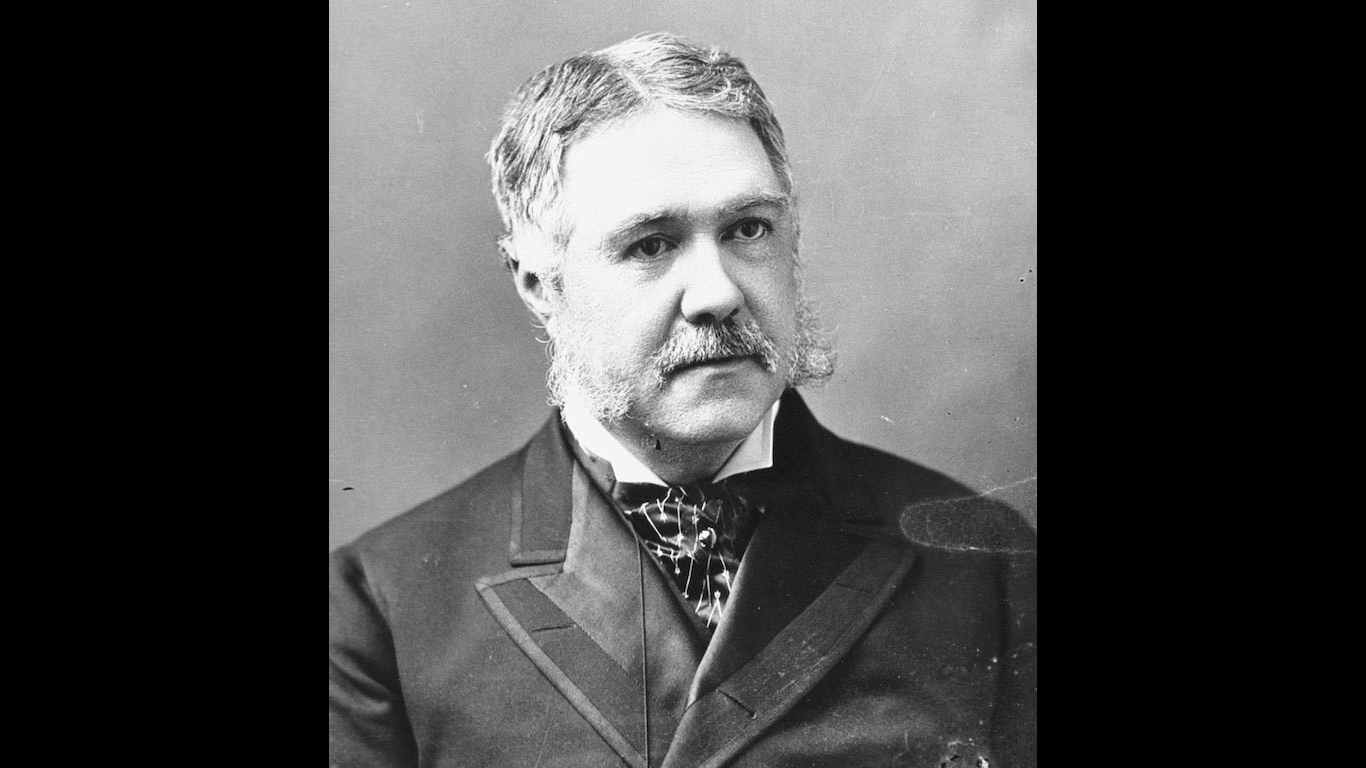
4. Chester Alan Arthur
> Term: 1881-1885 (21st president)
> Other occupations: School principal, attorney, customs collector
> Birthplace: Fairfield, Vermont
Chester A. Arthur’s first job out of college was a school teacher. He rose to become a school principal before leaving to focus on his law career. This led him to his position as a customs collector for the Port of New York. As president, Arthur dismantled that system, using his inside knowledge of how it worked.
[in-text-ad]

3. Woodrow Wilson
> Term: 1913-1921 (28th president)
> Other occupations: Professor, college president, governor
> Birthplace: Staunton, Virginia
Few presidents have been as knowledgeable about political theory as Woodrow Wilson. After earning his Ph.D. in political science, Wilson returned to Princeton, his alma mater, to be a professor. He worked his way up to become Princeton’s president, but he soon left political teaching behind to put his policies into action. Wilson won the election to become Governor of New Jersey in 1910, and just two years later he was elected president.

2. Calvin Coolidge
> Term: 1923-1929 (30th president)
> Other occupations: Lawyer, writer
> Birthplace: Plymouth Notch, Vermont
Calvin Coolidge, known as “Silent Cal,” had a steady 20-year career as a lawyer while he built up his political career. Coolidge started as a city councilman in Northampton, Massachusetts before working his way up to becoming the state’s governor and eventually president. After leaving office, Coolidge busied himself by writing his memoir and regular columns in various magazines.

1. Harry S. Truman
> Term: 1945-1953 (33rd president)
> Other occupations: Farmer, hat shop owner, judge
> Birthplace: Lamar, Missouri
Harry S. Truman worked a number of odd jobs in his early life. Truman, who did not attend college, started out working on his family farm before going out to work at a railroad construction company and then a bank. He did not find his passion for politics until he returned from service in the National Guard during World War I. Truman’s failed attempt at running a hat shop left him deeply in debt. He later used the contacts he made in the military to launch his career in politics, but his finances were in such poor shape, the presidential salary was doubled while he was in office.
If you’re one of the over 4 Million Americans set to retire this year, you may want to pay attention.
Finding a financial advisor who puts your interest first can be the difference between a rich retirement and barely getting by, and today it’s easier than ever. SmartAsset’s free tool matches you with up to three fiduciary financial advisors that serve your area in minutes. Each advisor has been carefully vetted, and must act in your best interests. Start your search now.
Don’t waste another minute; get started right here and help your retirement dreams become a retirement reality.
Thank you for reading! Have some feedback for us?
Contact the 24/7 Wall St. editorial team.